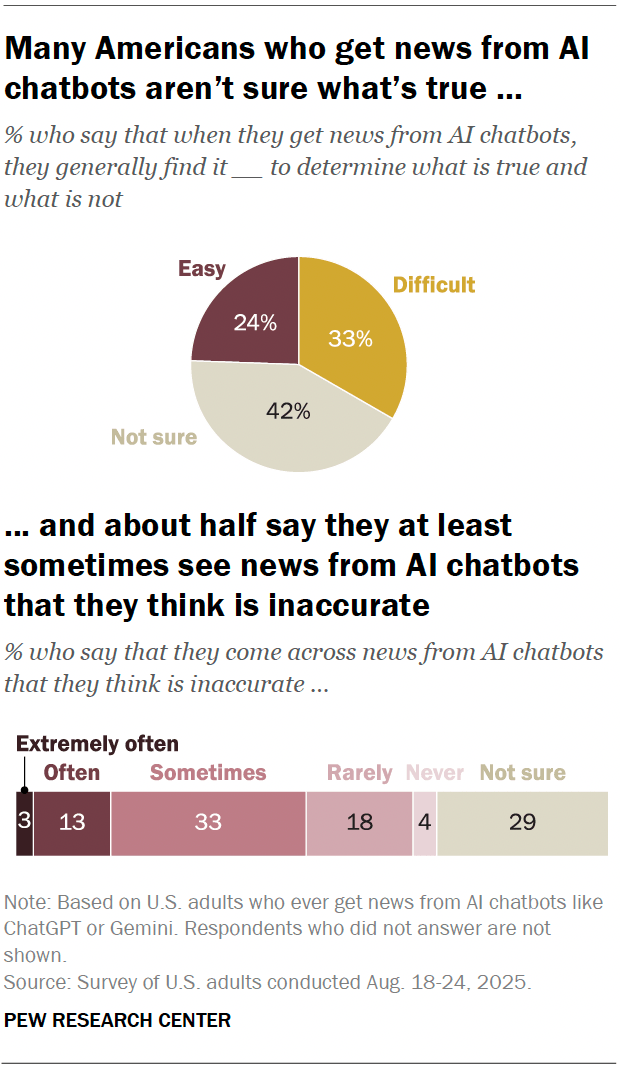☀️ Happy Thursday! The Briefing is your guide to the world of news and information. Sign up here!
In today’s email:
- Featured story: YouTube to pay $24.5 million to settle lawsuit over Trump’s account suspension
- New from Pew Research Center: Americans’ experiences with news from AI chatbots and search summaries
- In other news: FCC launches review of media ownership limits
- Looking ahead: GBH announces a $225 million fundraising campaign after Corporation for Public Broadcasting closure
- Chart of the week: Many Americans who get news from AI chatbots aren’t sure what’s true
🔥 Featured story
YouTube has agreed to pay a $24.5 million settlement to President Donald Trump and others whose accounts were suspended following the Jan. 6, 2021, riot at the U.S. Capitol. The platform froze Trump’s account, blocking him from uploading new videos under the argument that his content could incite more violence. Trump sued YouTube in October 2021, claiming that it and other social media companies that removed his accounts had unfairly censored him.
In a Center survey conducted in the days after Jan. 6, 2021, about half of U.S. adults (52%) said Trump bore a lot of responsibility for the violence and destruction committed by some of his supporters at the Capitol. Another 23% said he bore some responsibility, and 24% said he bore none at all. Republicans and GOP leaners were divided: Around half (52%) said Trump bore a lot or some responsibility for the riot, while 46% said he bore no responsibility at all. By contrast, an overwhelming majority of Democrats and Democratic leaners (95%) placed at least some blame on Trump.
🚨 New from Pew Research Center
This week, we released two new analyses on Americans’ use of artificial intelligence for news and their views of the information they get.
- Relatively few Americans are getting news from AI chatbots: Three-quarters of U.S. adults say they never get news from chatbots like ChatGPT or Gemini. Those who do get news from AI chatbots report mixed experiences with the information they get there – particularly when it comes to perceptions of its quality.
- Americans also have mixed feelings about AI summaries in search results: A majority of U.S. adults (65%) at least sometimes come across AI summaries in search results, with younger adults far more likely than older people to say they see these extremely often or often. Americans who have seen AI summaries in search results are lukewarm about their value.
📌 In other news
- FCC launches review of media ownership rules amid broadcasters’ lobbying push
- Federal judge halts Trump administration’s mass layoffs at Voice of America
- Google appears to be blocking AI search summaries about Trump and dementia
- Stephen Colbert, Jimmy Kimmel air rare late-night crossover after Kimmel’s suspension
- NBCUniversal, Google extend carriage deal to avoid blackout on YouTube TV programming
- Journalist injured by federal agents outside New York City immigration court
- Spotify co-founder Daniel Ek to step down as CEO
📅 Looking ahead
This week, PBS member station GBH in Boston announced a $225 million fundraising campaign following the closure of the Corporation for Public Broadcasting. GBH is set to lose $18 million in funding from that shutdown but risks long-term losses if other stations no longer broadcast its shows.
In a 2024 Center survey, just 15% of Americans said they had paid for local news in the past year. Among those who said they had not paid for local news, about half (49%) said the main reason they didn’t pay for it is because they could find plenty of free alternatives. Three-in-ten U.S. adults who hadn’t paid for local news cited a lack of interest in it, 10% said the content was not good enough to pay for, and 8% said it was too expensive.
📊 Chart of the week
This week’s chart comes from our new analysis on Americans’ experiences with news from AI chatbots. A third of Americans who get news from chatbots like ChatGPT or Gemini say they generally find it difficult to determine what is true and what is not. About a quarter (24%) say they find it easy. But the largest share (42%) isn’t sure.
Meanwhile, about half of adults who get news from AI chatbots say they at least sometimes come across news there that they think is inaccurate.

👋 That’s all for this week.
The Briefing is compiled by Pew Research Center staff, including Naomi Forman-Katz, Jacob Liedke, Christopher St. Aubin, Luxuan Wang, Emily Tomasik, and Joanne Haner. It is edited by Kirsten Eddy and copy edited by Anna Jackson.
Do you like this newsletter? Email us at journalism@pewresearch.org or fill out this two-question survey to tell us what you think.